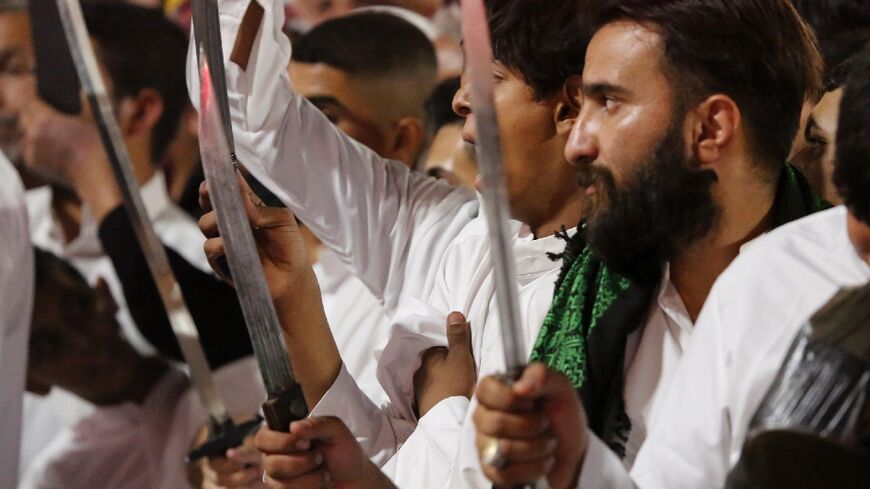In Ashura speech, Hezbollah chief warns Israel against invading Lebanon
This year, the Shiite holiday comes as the region is boiling amid the ongoing Israel-Hamas war in Gaza.

The chief of Hezbollah in Lebanon issued new threats against Israel Wednesday as heavy cross-border fire continues, vowing to strike more Israeli targets and wipe out the country's tanks should they invade the country.
“Continuing to target civilians will push the resistance to launch missiles and target new settlements that were not previously targeted,” Hezbollah Secretary General Hassan Nasrallah said in a televised speech delivered on the Shiite holy day of Ashura.
Nasrallah’s remarks come one day after at least five civilians, all Syrians and including three children, were killed in several Israeli airstrikes in southern Lebanon, according to NNA, the Lebanese state news agency.
More than 100 civilians and over 300 Hezbollah fighters have been killed since Hezbollah and the Israeli military began trading fire along the Israel-Lebanon border last October, according to a Reuters tally.
In Israel, 17 soldiers and 13 civilians have been killed, according to local authorities.
Iran-backed Hezbollah began launching rockets at northern Israel on Oct. 8, 2023, in support of the Palestinian Hamas in its war against Israel in the Gaza Strip. The cross-border hostilities have since escalated, raising concerns that a wider war will erupt and spread to the rest of the region.
In his Wednesday speech, Nasrallah addressed Israeli reports alleging that the military was suffering a shortage of tanks and ammunition amid its ongoing offensive in Gaza.
“Israel is not only short on soldiers to fight the war, now it is suffering from a shortage of tanks and munitions,” he said.
“If your tanks come to Lebanon and its south, you will not be suffering tank shortages, because you will have no tanks left,” he warned.
Israel has repeatedly threatened all-out war against Lebanon to eliminate the threat of Hezbollah. Meanwhile, diplomatic efforts, mainly led by the United States and France, are struggling to reach an agreement that would include a peaceful resolution of the Hezbollah-Israel hostilities.
Nasrallah addressed reports of such efforts, saying, “Everything that is being rumored about a ready agreement for the situation on the Lebanese front is incorrect.”
Nasrallah referenced other Iranian-backed groups in the region that have been launching attacks against Israel, including the Houthis in Yemen, saying, “The future situation in the south will be decided based on the results of the battle, in which the resistance and the supporting fronts will triumph.”
He stressed that the fighting will not stop as long as the Israeli war in Gaza and against the Palestinian people continues.
Ashura commemorations
Nasrallah delivered his speech at the end of Ashura rituals on Wednesday in the southern suburbs of Beirut, a Hezbollah stronghold.
Ashura falls on the tenth day of the Muslim month of Muharram. On that day, Shiites mark the anniversary of the killing of Imam Hussein, the Prophet Muhammad’s grandson, during the Battle of Karbala, in Iraq, in the seventh century.
Millions of Shiite Muslims around the world commemorated Ashura, which this year falls at a time of heightened regional tensions amid the Israel-Hamas war.
Large marches and processions were held in several countries with Shiite populations as well as reenactments of the Battle of Karbala. Shiite shrines attracted large crowds mourning the death of Imam Hussein.
Iran, the world’s largest Shiite country, witnessed mourning processions across its cities. Iranian state TV said Tuesday that 6 million Iranian pilgrims had traveled to Karbala to observe Ashura.
In Yemen, large crowds took to the streets of Sanaa, chanting slogans in support of the Palestinian people, while Houthi leader Abdulmalik al-Houthi gave a speech commemorating Ashura.
Many Shiite Muslims in Syria visited the shrine of Sayeda Zaynab, one of Syria’s most visited Shiite shrines, located near Damascus, the capital.
Shiites in Oman commemorated Ashura days after an attack against a Shiite mosque in the capital, Muscat, late on Monday. At least six people were killed in the shooting, which was claimed by the Islamic State.
In the past years, attacks against Shiites marking Ashura have been frequent.
Shiites make up around 10% of the world's 1.8 billion Muslims, according to the US-based Pew Research Center. They are estimated to number between 154 million and 200 million.






